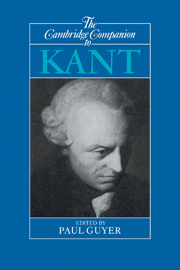Book contents
- Frontmatter
- Introduction
- 1 Kant's intellectual development
- 2 The Transcendental Aesthetic
- 3 Functions of thought and the synthesis of intuitions
- 4 The transcendental deduction of the categories
- 5 Causal laws and the foundations of natural science
- 6 Empirical, rational, and transcendental psychology
- 7 Reason and the practice of science
- 8 The critique of metaphysics
- 9 Vindicating reason
- 10 Autonomy, obligation, and virtue
- 11 Politics, freedom, and order
- 12 Taste, sublimity, and genius
- 13 Rational theology, moral faith, and religion
- 14 The first twenty years of critique
- Bibliography
- Index
8 - The critique of metaphysics
Kant and traditional ontology
Published online by Cambridge University Press: 28 May 2006
- Frontmatter
- Introduction
- 1 Kant's intellectual development
- 2 The Transcendental Aesthetic
- 3 Functions of thought and the synthesis of intuitions
- 4 The transcendental deduction of the categories
- 5 Causal laws and the foundations of natural science
- 6 Empirical, rational, and transcendental psychology
- 7 Reason and the practice of science
- 8 The critique of metaphysics
- 9 Vindicating reason
- 10 Autonomy, obligation, and virtue
- 11 Politics, freedom, and order
- 12 Taste, sublimity, and genius
- 13 Rational theology, moral faith, and religion
- 14 The first twenty years of critique
- Bibliography
- Index
Summary
Kant's attitude toward metaphysics and ontology is ambiguous in his Critical work. On the standard view of the Critique of Pure Reason, the positive and negative aspects of this attitude map neatly onto the two major sections of that work. After that first section presents a “Transcendental Analytic” of the understanding, or a “metaphysics of experience,” which legitimates the use of certain pure concepts necessary for structuring our spatiotemporal knowledge, a Transcendental Dialectic is provided to expose fallacies that theoretical reason entangles itself in when it extends itself beyond experience. Just prior to that Dialectic, Kant also inserts an “Appendix” on “concepts of reflection” that sketches how the restriction of our use of pure concepts to the domain of experience limits the general claims of the traditional ontology of the Leibnizian system. These attacks would appear to complement each other. Whereas the specific errors of rational psychology, rational cosmology, and rational theology are exposed in the core of the Dialectic, the critique of ontology and the general discussions of the operations of “reflection” and “reason” suggest a principle of closure for dismissing all claims of our theoretical reason that would stray beyond a merely immanent spatiotemporal field.
- Type
- Chapter
- Information
- The Cambridge Companion to Kant , pp. 249 - 279Publisher: Cambridge University PressPrint publication year: 1992
- 11
- Cited by



